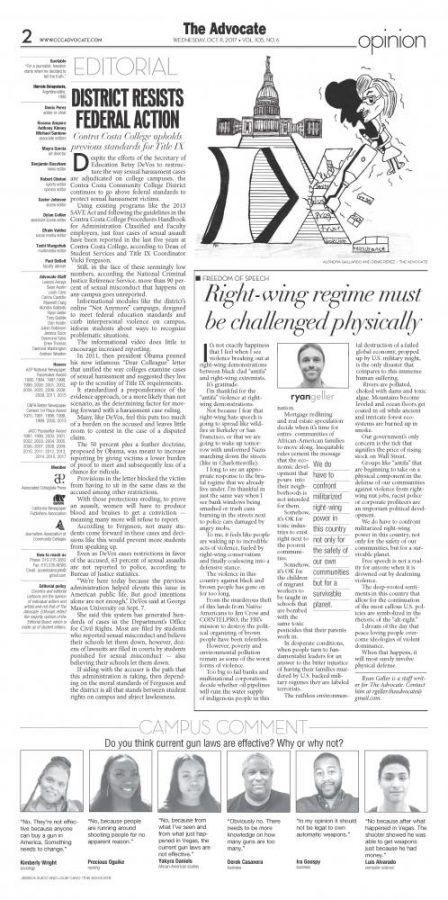District resists federal action on sexual harassment cases
Contra Costa College upholds previous standards for Title IX
Oct 11, 2017
Despite the efforts of the Secretary of Education Betsy DeVos to restructure the way sexual harassment cases are adjudicated on college campuses, the Contra Costa Community College District continues to go above federal standards to protect sexual harassment victims.
Using existing programs like the 2013 SAVE Act and following the guidelines in the Contra Costa College Procedures Handbook for Administration Classified and Faculty employees, just four cases of sexual assault have been reported in the last five years at Contra Costa College, according to Dean of Student Services and Title IX Coordinator Vicki Ferguson.
Still, in the face of these seemingly low numbers, according the National Criminal Justice Reference Service, more than 90 percent of sexual misconduct that happens on any campus goes unreported.
Informational modules like the district’s online “Not Anymore” campaign, designed to meet federal education standards and curb interpersonal violence on campus, inform students about ways to recognize problematic situations.
The informational video does little to encourage increased reporting.
In 2011, then president Obama penned his now infamous “Dear Colleague” letter that unified the way colleges examine cases of sexual harassment and suggested they live up to the scrutiny of Title IX requirements.
It standardized a preponderance of the evidence approach, or a more likely than not scenario, as the determining factor for moving forward with a harassment case ruling.
Many, like DeVos, feel this puts too much of a burden on the accused and leaves little room to contest in the case of a disputed claim.
The 50 percent plus a feather doctrine, proposed by Obama, was meant to increase reporting by giving victims a lower burden of proof to meet and subsequently less of a chance for ridicule.
Provisions in the letter blocked the victim from having to sit in the same class as the accused among other restrictions.
With those protections eroding, to prove an assault, women will have to produce blood and bruises to get a conviction — meaning many more will refuse to report.
According to Ferguson, not many students come forward in these cases and decisions like this would prevent more students from speaking up.
Even as DeVos eases restrictions in favor of the accused, 63 percent of sexual assaults are not reported to police, according to Bureau of Justice statistics.
“We’re here today because the previous administration helped elevate this issue in American public life. But good intentions alone are not enough,” DeVos said at George Mason University on Sept. 7.
She said this system has generated hundreds of cases in the Department’s Office for Civil Rights. Most are filed by students who reported sexual misconduct and believe their schools let them down, however, dozens of lawsuits are filed in courts by students punished for sexual misconduct — also believing their schools let them down.
If siding with the accuser is the path that this administration is taking, then depending on the moral standards of Ferguson and the district is all that stands between student rights on campus and abject lawlessness.


